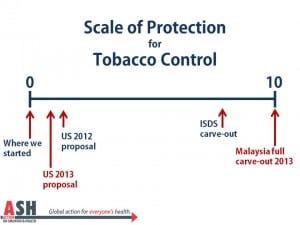December 9, 2014
An ISDS carve-out in the TPPA would be good for tobacco control, but not good enough.
There has been some scuttlebutt in trade circles over the past weeks about a possible US proposal in the ongoing Trans-Pacific Partnership (TPP) negotiations to exempt tobacco measures from the investment chapter. The effect would be to deny the tobacco industry of the right to sue governments over anti-tobacco regulations under the TPP. Without being able to confirm or deny the rumors (Reuters ran a news story here – broken link removed April 2023), we have begun thinking about what this proposal would mean.
When ASH began its work on the TPP in 2011, we were told by experts that we were wasting our time, that corporations, including the tobacco industry, so dominate trade negotiations that a change was impossible.
We have already proven that sentiment wrong. For the first time in trade negotiation history, not only has there been a robust conversation about tobacco in the TPP, there is a proposal from Malaysia for a full exemption, or carve-out, for tobacco measures. With negotiations expected to conclude in 2015, we are holding our breath and urging other countries to support Malaysia.
The chart below shows the relative adequacy
of the various positions on tobacco in the TPP.
We started with a clear “zero” – tobacco was treated the same as flour or toaster ovens. The first US proposal, in 2012, was extremely weak, but we scored it a “one” simply because it at least identified tobacco as a unique product in international trade.
In 2013, the US backed off from its poor position to one even poorer, earning a “one-half” on the ten-point scale. On the same day in August 2013, we learned that Malaysia had proposed a full carve-out for tobacco measures.
So why does a potential ISDS carve-out merit an “eight”? It addresses the most critical issue in the friction between trade law and strong tobacco measures – the industry’s right to sue governments directly. These suits cost governments millions, creating “regulatory chill”. Check out earlier blog entries on industry tactics using trade rules here.
Going back to 2011, achieving a tobacco carve-out for ISDS would have been considered a big win. It still is. But we can do better for public health, and the better solution has already been proposed by Malaysia.
Here is why a full carve-out is the best solution:
The tobacco industry finds government “champions”. An ISDS carve-out would still allow governments to sue other governments over tobacco control regulations. In the 1980s and early 90s, multinational tobacco corporations used the United States to sue foreign governments over tobacco regulations. President Clinton put a stop to that through an executive order, which is still in force. But the industry remains able to find champions.
Most recently, Ukraine was the first of five countries to sue Australia over its plain packaging law under WTO rules. Ukraine does not export any tobacco to Australia. British American Tobacco has publicly admitted that it is paying for Ukraine’s legal fees. Some have speculated that perhaps other monies changed hands under the former Yanukovych regime, perhaps to help pay for zoo animals.
There are other aspects of the TPP that potentially harm tobacco control. The TPP and most modern trade agreements give expanded rights and privileges to corporations. For example, the regulatory coherence chapter of the TPP would guarantee the tobacco industry a seat at the table when tobacco control laws and regulations are being considered.
This is in direct contradiction of Article 5.3 of the Framework Convention on Tobacco Control (FCTC), which prohibits industry interference in public health policy. Eleven of the 12 TPP negotiating countries have ratified the FCTC (the US is the only outlier, although it is a signatory). Many of these additional rights give government champions new causes for trade lawsuits.
Our own state Attorneys General agree that a full carve-out is necessary. While the federal government negotiates the TPP, state and local tobacco control laws are not immune to trade disputes. In our federal system, most of the real progress against the tobacco epidemic occurs at the state and local level.
Forty-five out of 50 Attorneys General have signed on to a letter endorsing Malaysia’s full carve-out proposal in order to protect state tobacco control legislation.
Tobacco is uniquely dangerous, and should not be treated like other products. Tobacco is the only consumer product that, when used exactly as intended, kills. As Prakit Vathesatogkit of Thailand said recently during the FCTC Conference of the Parties, “the purpose of international trade agreements is the free movement of goods, and tobacco is no good.”




